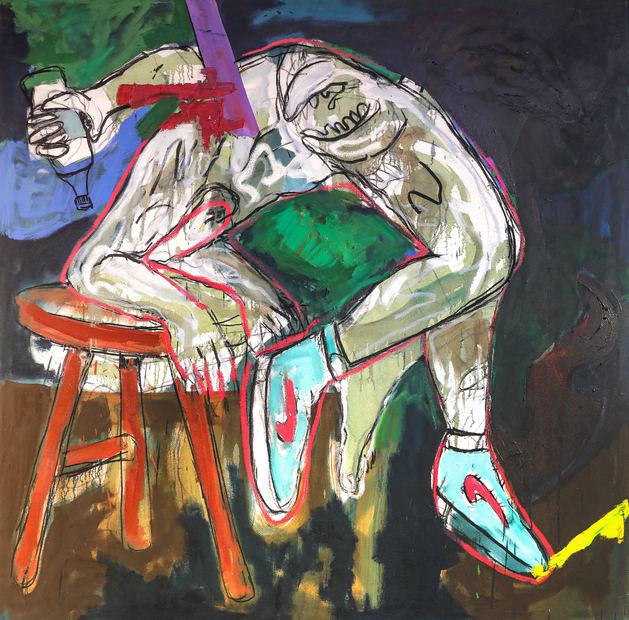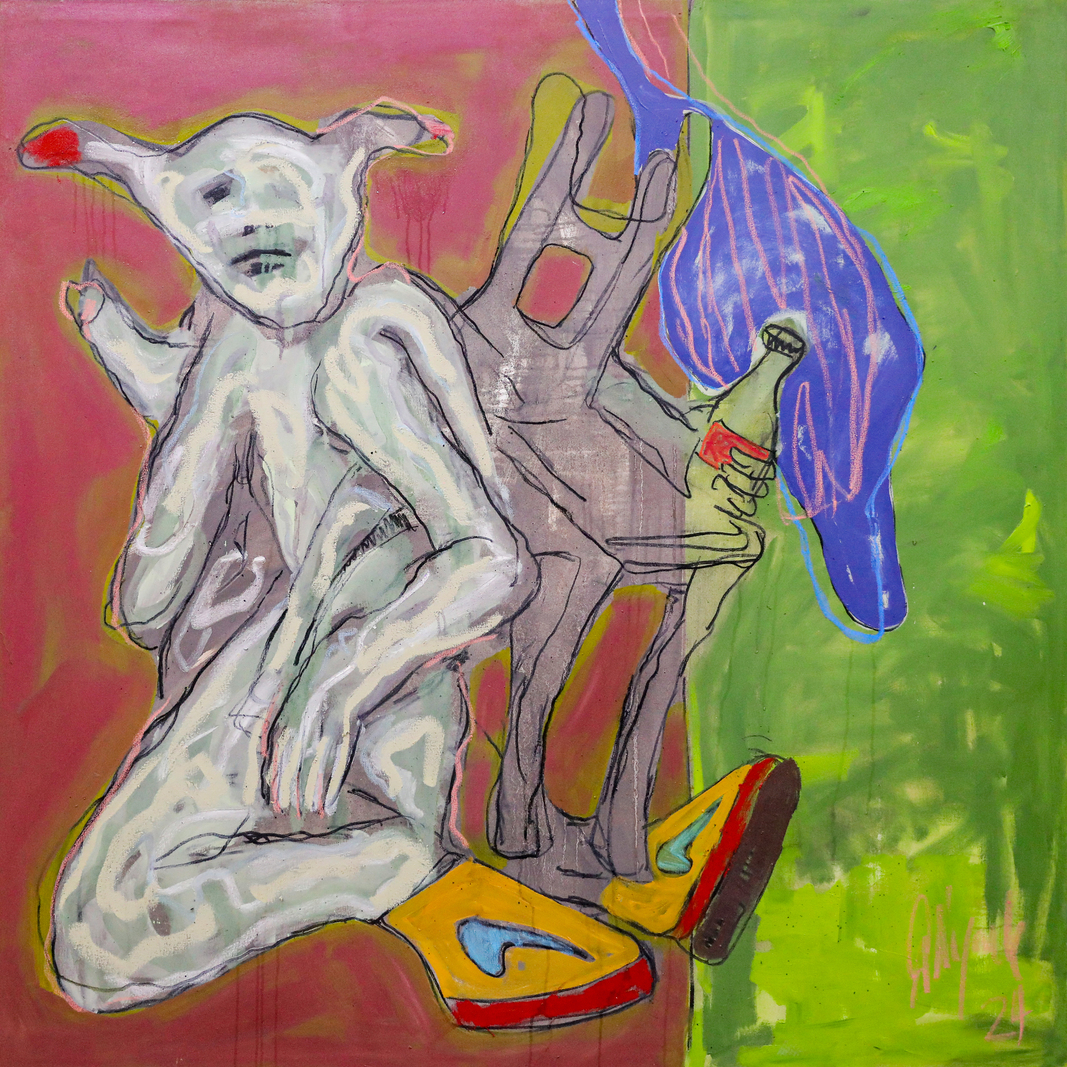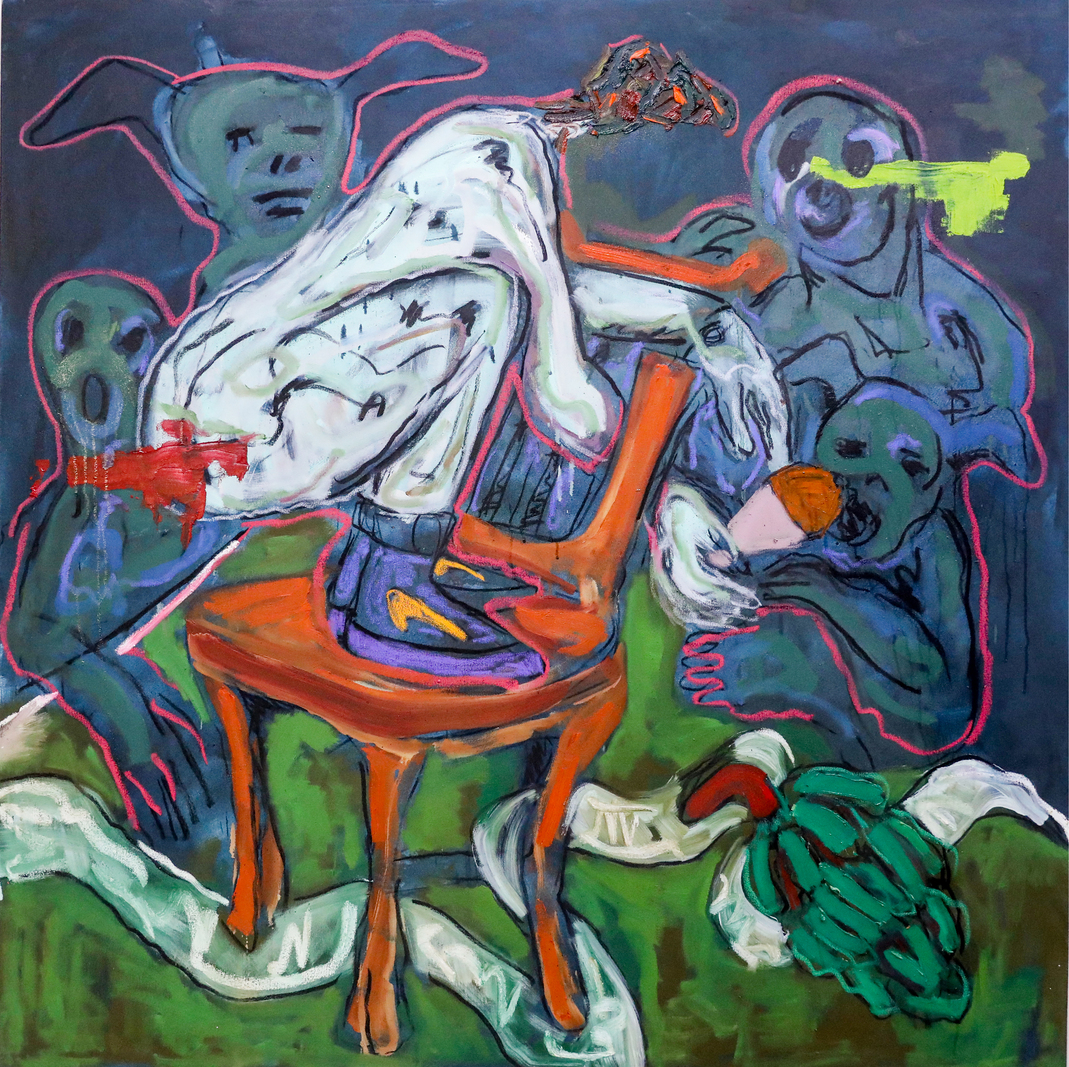One could argue that painting is the most visceral form of art making because it comes directly from the artist’s hand and onto the canvas. There is no filter there. Once the mark is made, it becomes true. Buoyed by a preoccupation with this part of painting, I took it upon myself to pose personalised questions to one of Southern Africa’s most recognised painters, Gresham Tapiwa Nyaude about his creative influences, approach to painting, recent accolades, and the unique challenges that face African painters.
Gresham Tapiwa Nyaude, a Zimbabwean artist, has gained international recognition, with pieces featured in the Smithsonian National Museum of African Art and the Rubell Family Collection. Now the young artist has been awarded the 2024 FNB Art Prize for his satirical art that aims to blend hope and political resistance. The prize includes a cash award and a solo exhibition at the Johannesburg Art Gallery (JAG). Nyaude’s work, influenced by his upbringing in Mbare, Harare, combines figuration, abstraction, and hallucination. So let’s get into it.
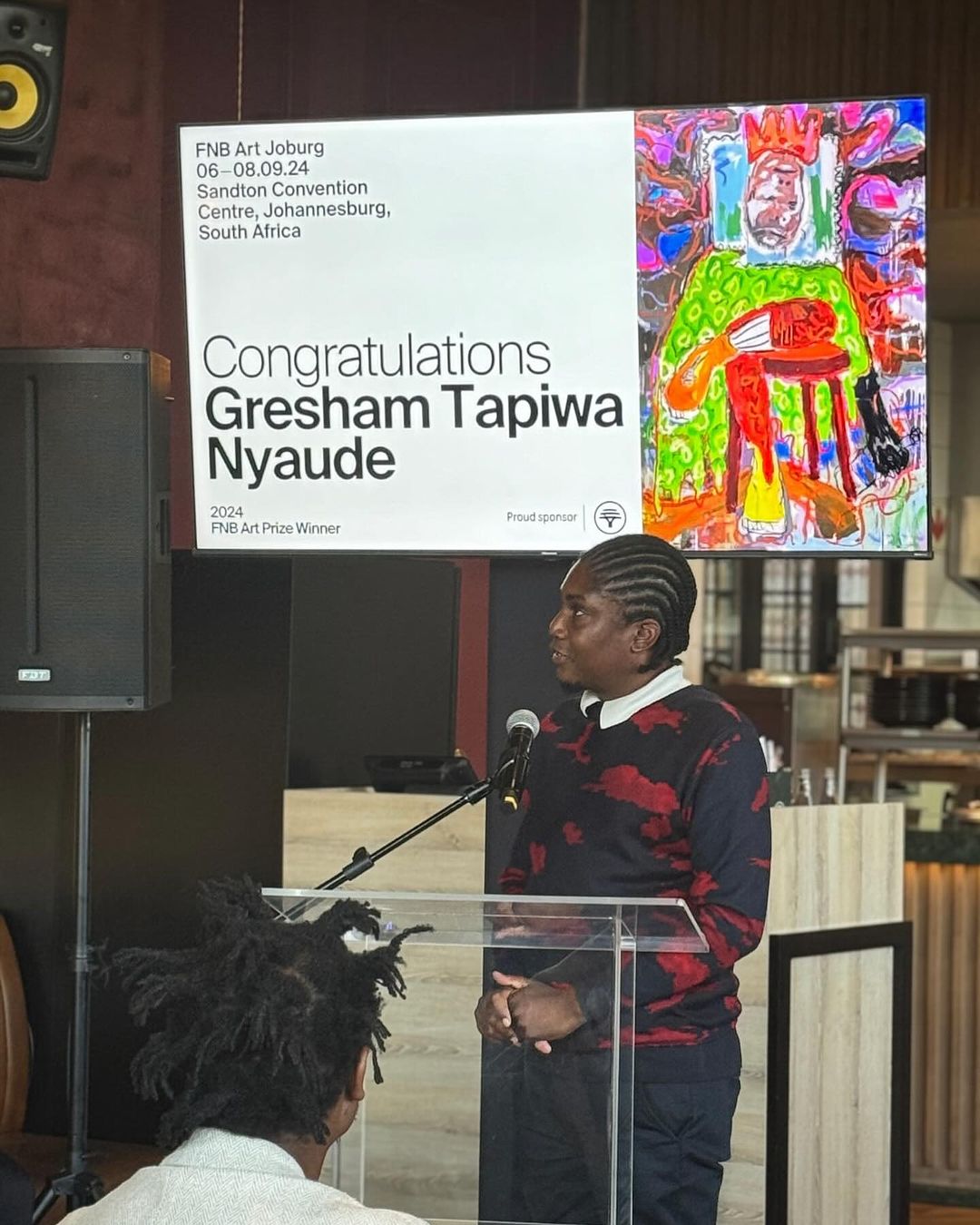
Thembeka Heidi Sincuba: How has receiving the 2024 FNB Art Prize impacted your career?
Gresham Tapiwa Nyaude: The result has been overwhelming, like, after getting the award, I mean, the exposure, the attention. […] I have a show currently so the timing is perfect. Now I’m able to reach a larger, global audience because of the FNB Art Prize.
THS: Can you tell us a little about being raised in Mbare? How did it influence your practice?
GTN: Well, yeah, so Mbare is one of the oldest townships in Harare. I think it was founded in 1906 or 1907. […] The unique thing about Mbare is that there’s a lot of street and raw energy. I can say that Mbare is sort of like a Sowetan type of energy. […] Zimbabwe is sort of like known for poverty, so in places like that, it sort of like creates room for […] creativity. Because like the other thing is with the economic pressures facing our country right now, young people are not employed, so it really pushes for that level of self-pushing and creativity. So it really impacted my life whereby like if you grow up in that space, you’re forced to pick up your own career. You’re forced to pick up your own life. Without resources and everything.
[…] I grew up drawing like at a tender age. Let’s say six years old, I was already drawing and painting and making sketches and everything. But in these neighbourhoods, there are no art schools because of how the colonel system was set up. We didn’t have subjects like art taught in school, so it was something that you had to do on your own and you had to be self-taught.
THS: Can you talk to me a little about this balance between abstraction and figuration in your work?
GTN: I started working professionally […] in 2007, 2008 at the National Gallery of Zimbabwe. There’s a a workshop for young artists, so from there I’ve been painting on my own, like really researching and I always have love for anatomy. I always have a love for exploring colour, at the same level […] whereby I use abstraction in the sense that I don’t really want my work to be direct. I want my audience to learn things. I want them to experience things. I want them to spend more time with the work. Then they can really simmer more in the work with time. So, because some of my subjects that I work with, some of them are very, like, sensitive. Like, politically in Zimbabwe, and I try as much as I can not to be direct, but to be subtle. […] So, hence comes the abstraction. But the balance has always been here whereby like as a painter […] because of 10 years experience […] painting is no longer a place that I visit, but I can say, it’s a place that I live.
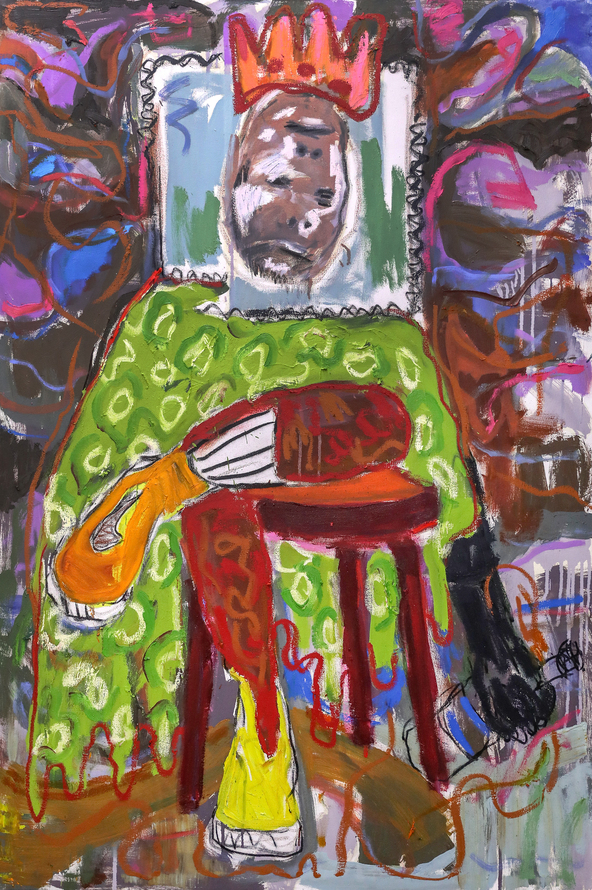
THS: How do you see your work and this type of practice contributing to the broader context of contemporary African art?
GTN: Well, I think my work […] is contributing in the way that […] at some point, [African art] was always undermined. They look low on us because they say “Oh, African art, it’s tribal […]. “ The Western world did not really put intellectual value [to it]. […] Most of the artists […] that were making art let’s say maybe in the 1950s […] they were sort of inspired by […] like theories or dreams. But, I mean, it didn’t come from an intellectual level. So I think my work when I look at painting […] I try as much as I can […] approaching it with intellectuality but speaking in an authentic African voice whereby […] us Africans we were one of the first people to invent paintings. Because of the rock paintings that are in our caves. It’s very evident that it’s there and the message that was being conveyed is very intellectual. So, that’s what I try if I work every time whereby like when I’m working, I try to speak with that voice.
THS: Being an artist in Africa, there are lots of difficulties. Can you tell me a little bit about some of the challenges that you’ve faced and maybe how you overcame them?
GTN: Oh, yeah. Well, I think when you’re starting out, […] to be able to do that in Africa […] I think that’s one of the biggest challenges. […], but I mean, I was lucky that I got exposed at an early age where I started exhibiting around the world through my gallery whereby they were just starting out so the chemistry was like we were just starting out together and we were exploring together […] and I was starting to get in these spaces So I think that’s the key thing where, as an African artist you have to establish yourself […] You have to find other ways […] But the other thing is, I think the biggest problem is the education. Because most of the books, they refer to Western art, than our African art.
THS: And what has it been like, I mean, you speak about language. You spoke about travelling the world. […] Do you see the difference in how your work is received abroad? What has that whole experience of just presenting your work outside of the African continent been like?
GTN: Well, I mean, to be honest, the response has always been amazing. […] The other thing that I’ve noticed is […] African artists, like we get into these big institutions at a very young age unlike their own artists. Because I think the other thing is like because of that sort of lack of resource, we will sort of end up pushing ourselves extra hard and they get to see how serious we are about expressing ourselves. The thing about working with language, it’s also fascinating because every symbol means something, even to that part of the world. Like maybe it might be the same or it might be different. But universally, language is very interesting because people are always curious to learn new things, like everyday and specifically, I use my language, the Shona language because it’s sort of like me, not only as an artist but also now an advocate and ambassador for my people whenever I’m in these spaces.
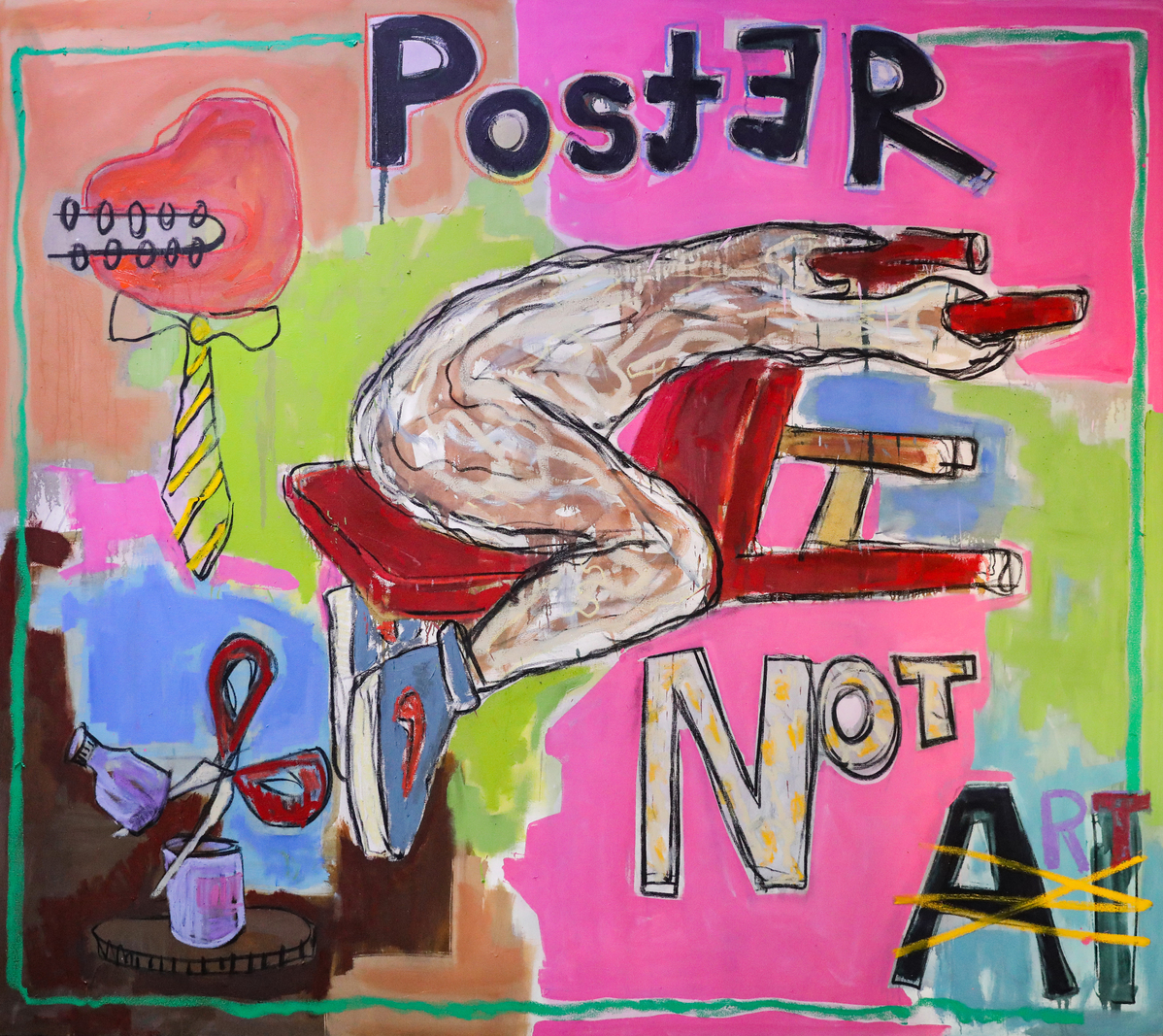
THS: So, what are your plans for your upcoming solo exhibition at JAG after the big win?
GTN: Wow, yeah! I mean I’ve just started working on it now. Since I’m back I’m putting in concepts and ideas […] Just thinking of the best way to present that body of work. So I think I won’t say much because the other thing is like, I want to be surprised in the process like everyone else as well, so I really don’t try to push an idea or a topic. I just want it to be organic But let’s say maybe at the end of the second period I’ll have a proper direction […] because I want to incorporate as well, like being an FNB Art Prize Winner, working, like the opportunities. Like what it has sort of garnered for me. I want that to be part of the process as well. So, I’m not gonna rush myself because I think it’s gonna be next year in August, so I’m gonna really take it easy. […] I want to be part of the audience the day it opens too because […] I want to be surprised too.
If you’re as obsessed with painting as I am, then you’re gonna wanna keep a close eye on this painter. Not only because of the confidence with which he attacks his canvas but because of how much prestige he is garnering. His paintings are strong because they begin to undo the trope of what is known as African art. They weave together the past and the present in a manner that manifests space for new pockets of autographic expression. Who knows what will come of his upcoming exhibition at JAG, but what is certain is that it will be a welcome infusion of rare painterly verity.
